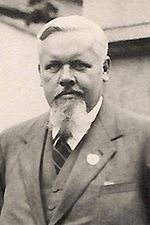Oskar Anderson
| Oskar Anderson | |
|---|---|

Oskar Anderson in Tartu (around 1930)
|
|
| Born | Oskar Johann Viktor Anderson August 2, 1887 Minsk, Russian Empire |
| Died | February 12, 1960 (aged 72) Munich, Germany |
| Nationality | German, Bulgarian |
| Fields | |
| Institutions | |
| Alma mater | |
| Thesis | (1912) |
| Academic advisors | Alexander Alexandrovich Chuprov |
| Known for | Variate Difference Method |
| Spouse | Margarethe Natalie von Hindenburg-Hirtenberg |
Oskar Johann Viktor Anderson (Belarusian: Оскар Віктар Андэрсан; 2 August 1887, Minsk, Russian Empire – 12 February 1960, Munich, Germany) was a German-Russian mathematician. He was most famously known for his work on mathematical statistics.
Anderson was born from a German family in Minsk (now in Belarus), but soon moved to Kazan (Russia). His father, Nikolai Anderson, was professor in Finno-Ugric languages at the University of Kazan. His older brothers were the folklorist Walter Anderson and the astrophysicist Wilhelm Anderson. Oskar Anderson graduated from Kazan Gymnasium with a gold medal in 1906. After studying mathematics for one year at the University of Kazan, he moved to St. Petersburg to study economics at the Polytechnic Institute. From 1907 to 1915, he was Aleksandr Chuprov's assistant. In 1912 he started lecturing at a commercial school in St. Petersburg. In 1918 he took on a professorship in Kiev but he was forced to flee Russia in 1920 due to the Russian Revolution, first taking a post in Budapest (Hungary) before becoming a professor at the University of Economics at Varna (Bulgaria) in 1924.
...
Wikipedia
